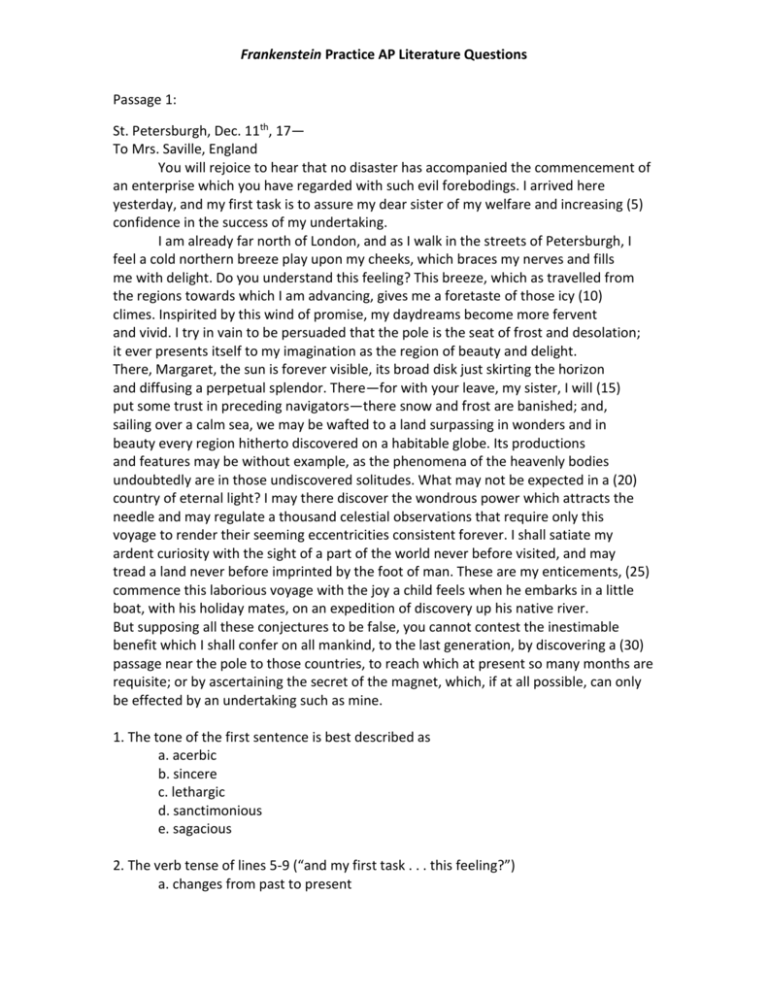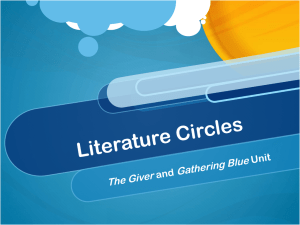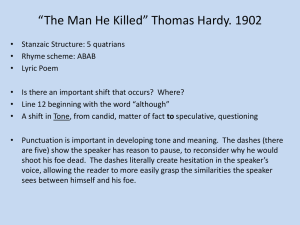Frankenstein AP Literature Practice Questions
advertisement

Frankenstein Practice AP Literature Questions Passage 1: St. Petersburgh, Dec. 11th, 17— To Mrs. Saville, England You will rejoice to hear that no disaster has accompanied the commencement of an enterprise which you have regarded with such evil forebodings. I arrived here yesterday, and my first task is to assure my dear sister of my welfare and increasing (5) confidence in the success of my undertaking. I am already far north of London, and as I walk in the streets of Petersburgh, I feel a cold northern breeze play upon my cheeks, which braces my nerves and fills me with delight. Do you understand this feeling? This breeze, which as travelled from the regions towards which I am advancing, gives me a foretaste of those icy (10) climes. Inspirited by this wind of promise, my daydreams become more fervent and vivid. I try in vain to be persuaded that the pole is the seat of frost and desolation; it ever presents itself to my imagination as the region of beauty and delight. There, Margaret, the sun is forever visible, its broad disk just skirting the horizon and diffusing a perpetual splendor. There—for with your leave, my sister, I will (15) put some trust in preceding navigators—there snow and frost are banished; and, sailing over a calm sea, we may be wafted to a land surpassing in wonders and in beauty every region hitherto discovered on a habitable globe. Its productions and features may be without example, as the phenomena of the heavenly bodies undoubtedly are in those undiscovered solitudes. What may not be expected in a (20) country of eternal light? I may there discover the wondrous power which attracts the needle and may regulate a thousand celestial observations that require only this voyage to render their seeming eccentricities consistent forever. I shall satiate my ardent curiosity with the sight of a part of the world never before visited, and may tread a land never before imprinted by the foot of man. These are my enticements, (25) commence this laborious voyage with the joy a child feels when he embarks in a little boat, with his holiday mates, on an expedition of discovery up his native river. But supposing all these conjectures to be false, you cannot contest the inestimable benefit which I shall confer on all mankind, to the last generation, by discovering a (30) passage near the pole to those countries, to reach which at present so many months are requisite; or by ascertaining the secret of the magnet, which, if at all possible, can only be effected by an undertaking such as mine. 1. The tone of the first sentence is best described as a. acerbic b. sincere c. lethargic d. sanctimonious e. sagacious 2. The verb tense of lines 5-9 (“and my first task . . . this feeling?”) a. changes from past to present Frankenstein Practice AP Literature Questions b. changes from present continuous to present c. changes from present to past d. remains in present tense e. changes from future to present 3. The sentence in lines 7-9 (“I am . . . delight”) is a. complex b. compound c. periodic d. antithetical e. balanced 4. The speaker indicates that he is traveling a. from England to St. Petersburgh b. from London to Russia c. to a place that may or may not exist d. to heaven e. north 5. The speaker expects his destination to be a. romantic b. anticlimactic c. unparalleled d. dark e. frosty 6. The simile in lines 19-20 (“as the phenomena . . . undiscovered solitudes”) compares a. the speaker’s definition’s features to starts b. undiscovered land to the solar system c. the globe to heaven d. snow to heaven e. preceding navigators to phenomena 7. The repetition of the word “there” in lines 14-16 is an example of a. redundancy b. wordiness c. epistrophe d. anaphora e. leitmotif 8. The speaker’s “enticements” (25) include all of the following except a. the promise of discovery b. the hope of regulating c. the change of uncovering secrets Frankenstein Practice AP Literature Questions d. unlimited expectations e. the hope of becoming notorious 9. The speaker’s comparison in lines 27-28 (“with the joy . . . native river.”) emphasizes a. the severity of the journey b. the risks the speaker is willing to incur c. the speaker’s homesickness d. the speaker’s unfeigned enthusiasm e. the speaker’s apprehension 10. The first paragraph of the passage and lines 29-33 (“But supposing . . . such as mine.”) emphasize the speaker’s a. goals b. friendship with his sister c. need to convince d. doubts e. need for friendship 11. The word “inestimable” (29) most likely means a. praiseworthy b. immeasurable c. fathomable d. fallible e. factual 12. The style of the passage as a whole appears to be similar to that of a. a bildungsroman b. a myth c. an epistolary novel d. a legend e. an allegory 13. The passage includes which of the following devices? I. sensory imagery II. rhetorical questions III. invocation a. b. c. d. e. I only I and II only II and III only I, II, and III III only Frankenstein Practice AP Literature Questions Passage 2: There was a considerable difference between the ages of my parents, but this circumstance seemed to unite them only closer in bonds of devoted affection. There was a sense of justice in my father’s upright mind which rendered it necessary that he should approve highly to love strongly. Perhaps during former years he has suffered from the late-discovered unworthiness of one beloved and so was disposed (5) to set a greater value on tried worth. There was a show of gratitude and worship in his attachment to my mother, differing wholly from the doting fondness of age, for it was inspired by reverence for her virtues and a desire to be the means of, in some degree, recompensing her for the sorrows she had endured, but which gave inexpressible grace to his behavior to her. Everything was made to yield to her (10) wishes and her convenience. He strove to shelter her, as a fair exotic is sheltered by the gardener, from every rougher wind and to surround her with all that could tend to excite pleasurable emotion in her soft and benevolent mind. Her health, and even the tranquility of her hitherto constant spirit, had been shaken by what she had gone through. During the two years that had elapsed previous to their marriage (15) my father had gradually relinquished all his public functions; and immediately after their union they south the pleasant climate of Italy, and the change of scene and interest attendant on a tour through that land of wonders, as a restorative for her weakened frame. From Italy they visited Germany and France. I, their eldest child, was born at (20) Naples, and as an infant accompanied them in their rambles. I remained for several years their only child. Much as they were attached to each other, they seemed to draw inexhaustible stores of affection from a very mine of love to bestow them upon me. My mother’s tender caresses and my father’s smile of benevolent pleasure while regarding me are my first recollections. I was their plaything and their idol, (25) and something better – their child, the innocent and helpless creature bestowed on them by heaven, whom to bring up to good, and whose future lot it was in their hands to direct to happiness or misery, according as they fulfilled their duties towards me. With this deep consciousness of what they owed towards the being to which they had given life, added to the active spirit of tenderness that animated (30) both, it may be imagined that while during every hour of my infant life I received a lesson of patience, of charity, and of self-control, I was so guided by a silken cord that all seemed but one train of enjoyment to me. For a long time I was their only offspring. When I was about five years old, while making an excursion beyond the (35) frontiers of Italy, they passed a week on the shores of the Lake of Como. Their benevolent disposition often made them enter the cottages of the poor. This, to my mother, was more than a duty; it was a necessity, a passion – remembering what she had suffered, and how she had been relieved – for her to act in her turn the guardian angel to the afflicted. During one of their walks a poor cot in the foldings (40) of a vale attracted their notices as being singularly disconsolate, while the number of half-clothed children gathered about it spoke of penury in its worst shape. One day, when my father had gone by himself to Milan, my mother, accompanied by me, visited this abode. She found a peasant and his wife, hard working, bent down Frankenstein Practice AP Literature Questions by care and labour, distributing a scanty meal to five hungry babes. Among these (45) there was one which attracted my mother far above all the rest. She appeared of a different stock. The four others were dark-eyed, hardly little vagrants; this child was thin and very fair. Her hair was the brightest living gold, and despite the poverty of her clothing, seemed to set a crown of distinction on her head. Her brow was clear and ample, her blue eyes cloudless, and her lips and the moulding of her face so (50) expressive of sensibility and sweetness that none could behold her without looking on her as distinct species, a being heaven-sent, and bearing a celestial stamp in all her features. 14. The opening phrases of the first, second, and fourth sentences create an example of a. anaphora b. doubts c. conjectures d. descriptions of the setting e. facts 15. In line 8, “it” refers to a. “doting” b. “his attachment” c. “a show of gratitude and worship” d. “fondness of age” e. “my mother” 16. The narrator’s mother is presented as all of the following except a. virtuous b. munificent c. importunate d. convalescent e. enervated 17. The simile in line 11 characterizes a. the mother as distinct b. the mother as distinguished c. the father as nurturing d. the mother as a child e. the father as officious 18. What is the relationship between the first and second paragraphs? a. The first asks questions that the second answers. b. The first poses theories that the second explores. c. The second belies assumptions made in the first. d. The first provides background for comprehension of the second. e. The first sparks curiosity that the second satiates. Frankenstein Practice AP Literature Questions 19. The metaphor in lines 21-23 emphasizes a. the parents’ infinite capacity to love b. the parents’ industriousness c. the parents’ economic class d. the speaker’s importance in the family e. the hierarchy within the family 20. The word “idol” in lined 25 implies that a. the parents saw religious power in their child b. the child is like a prophet c. the parents admire their child d. the speaker is arrogant e. the parents worship their child 21. The sentence in lines 29-33 is a. simple b. periodic c. a run-on d. compound e. cumulative 22. The phrase “silken cord” (32) is an example of a. metonymy b. synecdoche c. metaphor d. synesthesia e. hyperbole 23. The word “penury” in line 42 most likely means a. destination b. itinerancy c. sadness d. vagrancy e. selfishness 24. The girl described in lines 46-53 is characterized as I. striking II. inhuman and tow-headed III. sartorially Spartan a. I only b. I and II only c. II only d. II and III only Frankenstein Practice AP Literature Questions e. I and III only 25. The description of the girl in lines 46-53 contains all of the following devices except a. allusion b. simile c. alliteration d. hyperbole e. polysyndeton 26. The tone of the passage can be described as a. grave b. factual c. mawkish d. resentful e. sardonic 27. The main purpose of the passage as a whole is a. to characterize the speaker’s mother b. to characterize the speaker c. to characterize the father d. to describe the setting e. to characterize the speaker’s family








